Analyzing Professional Development Principles in Healthcare Practices
VerifiedAdded on 2021/02/18
|10
|2353
|23
Report
AI Summary
This report delves into the principles of professional development within the healthcare sector, emphasizing continuous improvement of knowledge and practice. It explores potential barriers to professional growth, compares different support systems, and highlights factors for selecting relevant opportunities. The report then focuses on prioritizing development goals, preparing a professional development plan, and establishing evaluation processes. Furthermore, it examines reflective practice models, its importance for performance enhancement, and the use of feedback. The report includes an analysis of reflective practice models such as the Gibbs model and Boud's model, and provides a practical professional development plan for medical practitioners. This report is a valuable resource for students on Desklib seeking to understand and improve their professional development strategies.
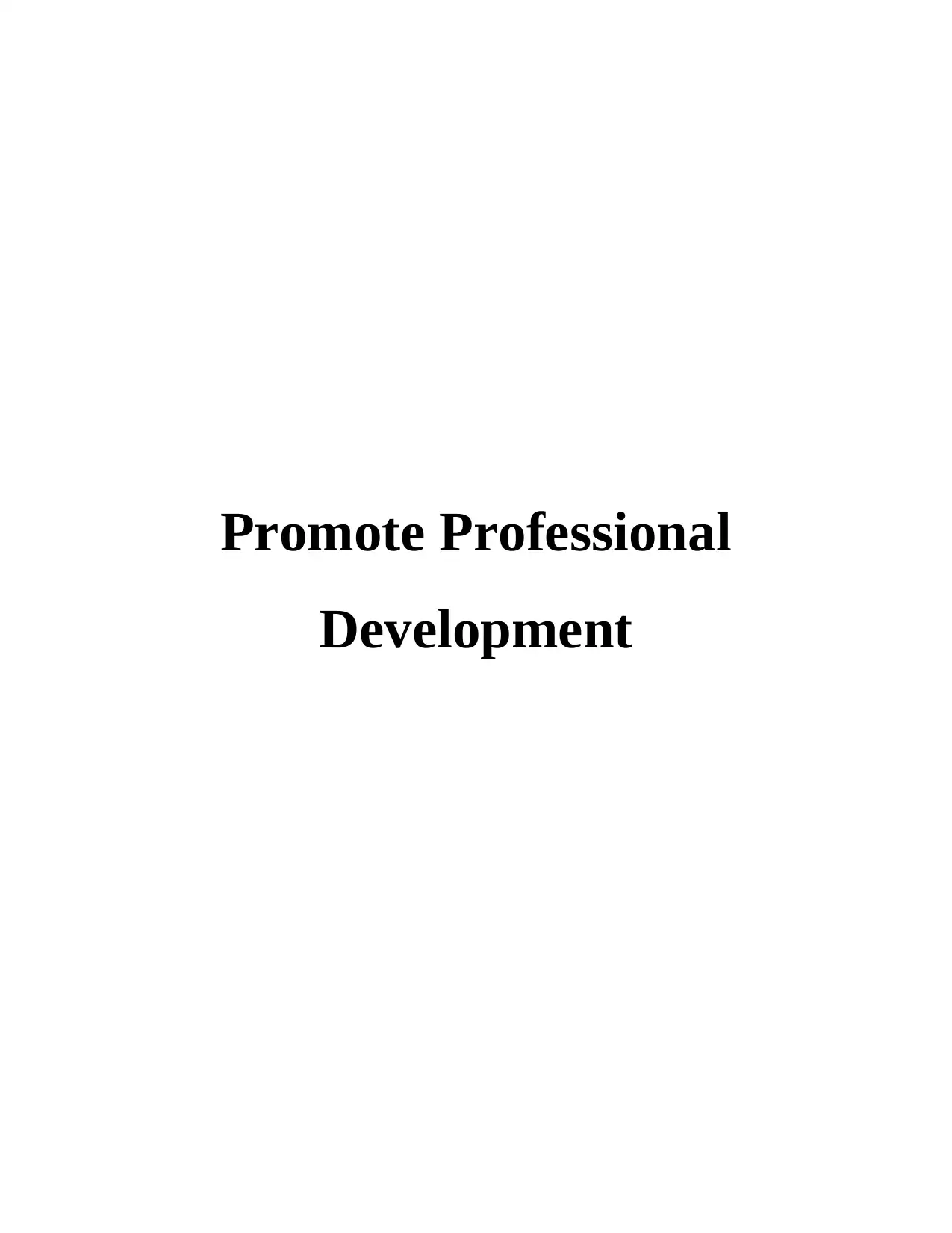
Promote Professional
Development
Development
Paraphrase This Document
Need a fresh take? Get an instant paraphrase of this document with our AI Paraphraser
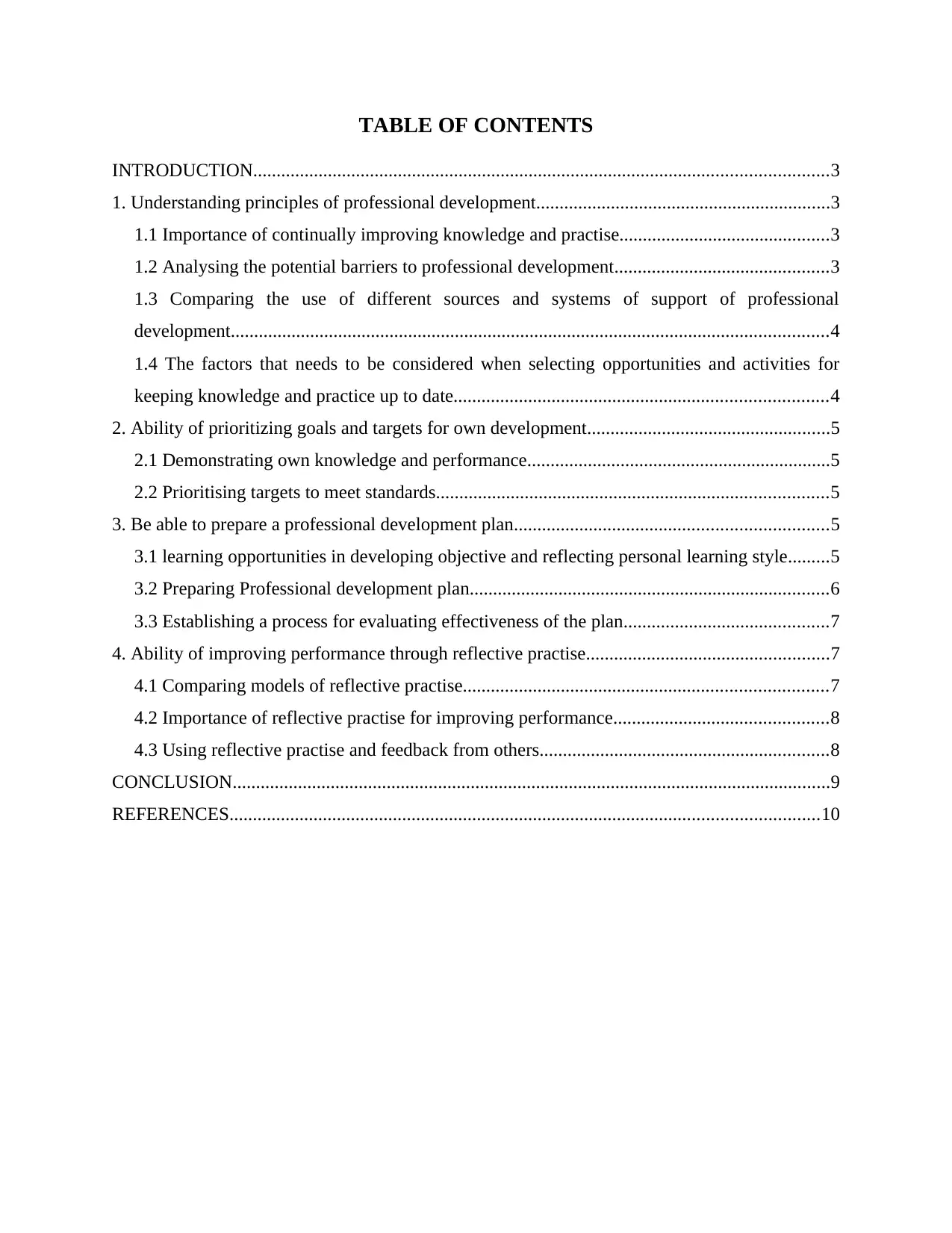
TABLE OF CONTENTS
INTRODUCTION...........................................................................................................................3
1. Understanding principles of professional development...............................................................3
1.1 Importance of continually improving knowledge and practise.............................................3
1.2 Analysing the potential barriers to professional development..............................................3
1.3 Comparing the use of different sources and systems of support of professional
development................................................................................................................................4
1.4 The factors that needs to be considered when selecting opportunities and activities for
keeping knowledge and practice up to date................................................................................4
2. Ability of prioritizing goals and targets for own development....................................................5
2.1 Demonstrating own knowledge and performance.................................................................5
2.2 Prioritising targets to meet standards....................................................................................5
3. Be able to prepare a professional development plan...................................................................5
3.1 learning opportunities in developing objective and reflecting personal learning style.........5
3.2 Preparing Professional development plan.............................................................................6
3.3 Establishing a process for evaluating effectiveness of the plan............................................7
4. Ability of improving performance through reflective practise....................................................7
4.1 Comparing models of reflective practise..............................................................................7
4.2 Importance of reflective practise for improving performance..............................................8
4.3 Using reflective practise and feedback from others..............................................................8
CONCLUSION................................................................................................................................9
REFERENCES..............................................................................................................................10
INTRODUCTION...........................................................................................................................3
1. Understanding principles of professional development...............................................................3
1.1 Importance of continually improving knowledge and practise.............................................3
1.2 Analysing the potential barriers to professional development..............................................3
1.3 Comparing the use of different sources and systems of support of professional
development................................................................................................................................4
1.4 The factors that needs to be considered when selecting opportunities and activities for
keeping knowledge and practice up to date................................................................................4
2. Ability of prioritizing goals and targets for own development....................................................5
2.1 Demonstrating own knowledge and performance.................................................................5
2.2 Prioritising targets to meet standards....................................................................................5
3. Be able to prepare a professional development plan...................................................................5
3.1 learning opportunities in developing objective and reflecting personal learning style.........5
3.2 Preparing Professional development plan.............................................................................6
3.3 Establishing a process for evaluating effectiveness of the plan............................................7
4. Ability of improving performance through reflective practise....................................................7
4.1 Comparing models of reflective practise..............................................................................7
4.2 Importance of reflective practise for improving performance..............................................8
4.3 Using reflective practise and feedback from others..............................................................8
CONCLUSION................................................................................................................................9
REFERENCES..............................................................................................................................10
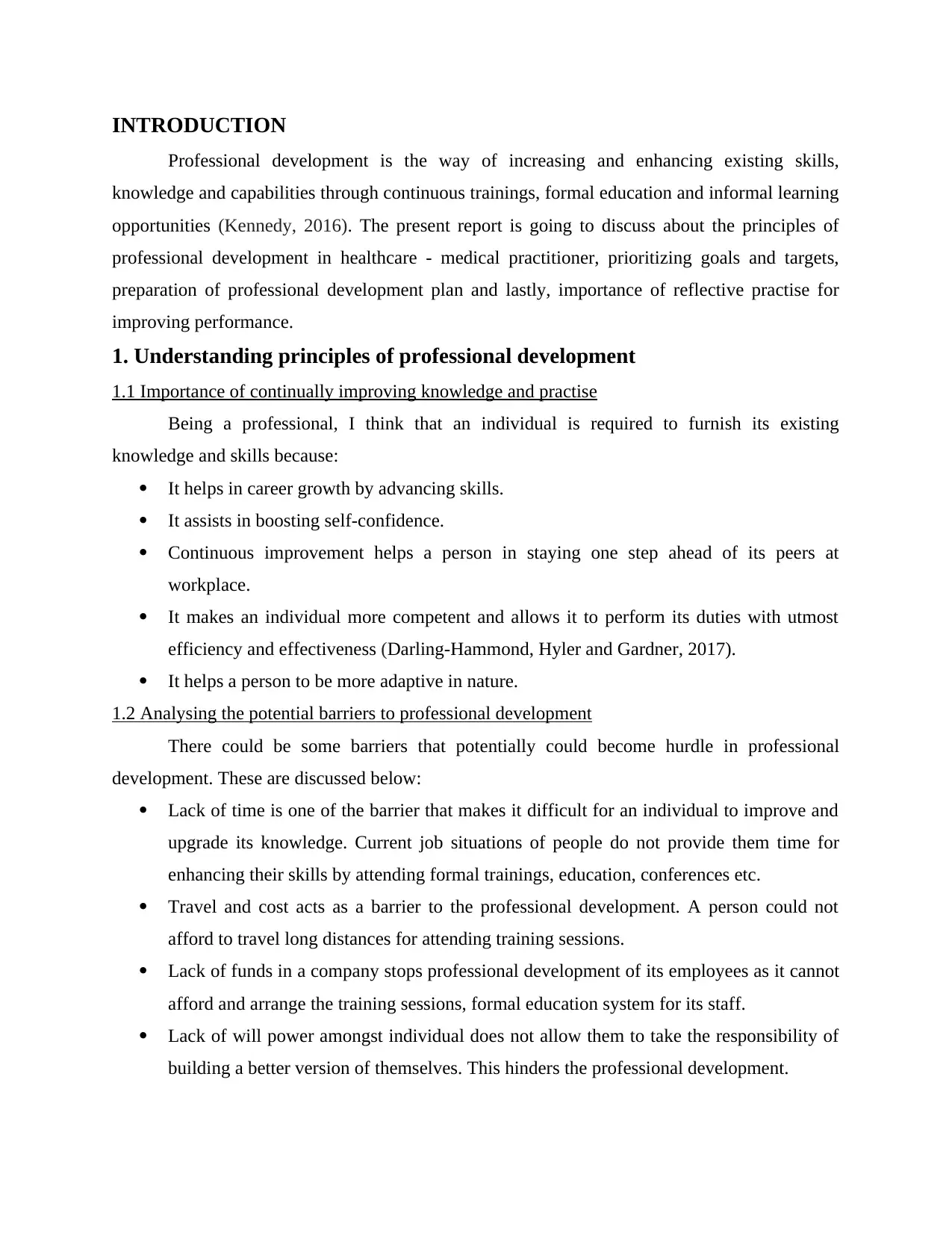
INTRODUCTION
Professional development is the way of increasing and enhancing existing skills,
knowledge and capabilities through continuous trainings, formal education and informal learning
opportunities (Kennedy, 2016). The present report is going to discuss about the principles of
professional development in healthcare - medical practitioner, prioritizing goals and targets,
preparation of professional development plan and lastly, importance of reflective practise for
improving performance.
1. Understanding principles of professional development
1.1 Importance of continually improving knowledge and practise
Being a professional, I think that an individual is required to furnish its existing
knowledge and skills because:
It helps in career growth by advancing skills.
It assists in boosting self-confidence.
Continuous improvement helps a person in staying one step ahead of its peers at
workplace.
It makes an individual more competent and allows it to perform its duties with utmost
efficiency and effectiveness (Darling-Hammond, Hyler and Gardner, 2017).
It helps a person to be more adaptive in nature.
1.2 Analysing the potential barriers to professional development
There could be some barriers that potentially could become hurdle in professional
development. These are discussed below:
Lack of time is one of the barrier that makes it difficult for an individual to improve and
upgrade its knowledge. Current job situations of people do not provide them time for
enhancing their skills by attending formal trainings, education, conferences etc.
Travel and cost acts as a barrier to the professional development. A person could not
afford to travel long distances for attending training sessions.
Lack of funds in a company stops professional development of its employees as it cannot
afford and arrange the training sessions, formal education system for its staff.
Lack of will power amongst individual does not allow them to take the responsibility of
building a better version of themselves. This hinders the professional development.
Professional development is the way of increasing and enhancing existing skills,
knowledge and capabilities through continuous trainings, formal education and informal learning
opportunities (Kennedy, 2016). The present report is going to discuss about the principles of
professional development in healthcare - medical practitioner, prioritizing goals and targets,
preparation of professional development plan and lastly, importance of reflective practise for
improving performance.
1. Understanding principles of professional development
1.1 Importance of continually improving knowledge and practise
Being a professional, I think that an individual is required to furnish its existing
knowledge and skills because:
It helps in career growth by advancing skills.
It assists in boosting self-confidence.
Continuous improvement helps a person in staying one step ahead of its peers at
workplace.
It makes an individual more competent and allows it to perform its duties with utmost
efficiency and effectiveness (Darling-Hammond, Hyler and Gardner, 2017).
It helps a person to be more adaptive in nature.
1.2 Analysing the potential barriers to professional development
There could be some barriers that potentially could become hurdle in professional
development. These are discussed below:
Lack of time is one of the barrier that makes it difficult for an individual to improve and
upgrade its knowledge. Current job situations of people do not provide them time for
enhancing their skills by attending formal trainings, education, conferences etc.
Travel and cost acts as a barrier to the professional development. A person could not
afford to travel long distances for attending training sessions.
Lack of funds in a company stops professional development of its employees as it cannot
afford and arrange the training sessions, formal education system for its staff.
Lack of will power amongst individual does not allow them to take the responsibility of
building a better version of themselves. This hinders the professional development.
⊘ This is a preview!⊘
Do you want full access?
Subscribe today to unlock all pages.

Trusted by 1+ million students worldwide
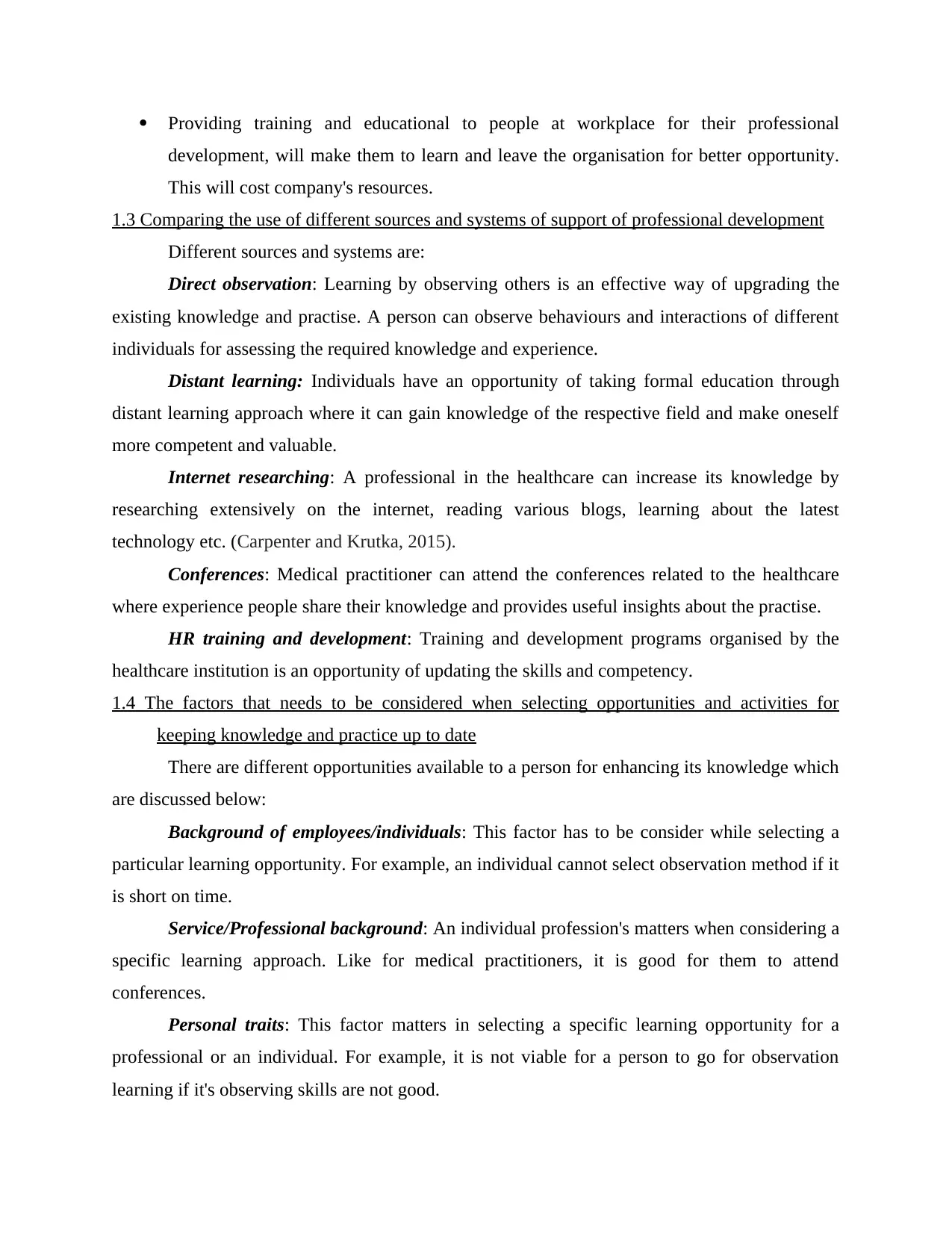
Providing training and educational to people at workplace for their professional
development, will make them to learn and leave the organisation for better opportunity.
This will cost company's resources.
1.3 Comparing the use of different sources and systems of support of professional development
Different sources and systems are:
Direct observation: Learning by observing others is an effective way of upgrading the
existing knowledge and practise. A person can observe behaviours and interactions of different
individuals for assessing the required knowledge and experience.
Distant learning: Individuals have an opportunity of taking formal education through
distant learning approach where it can gain knowledge of the respective field and make oneself
more competent and valuable.
Internet researching: A professional in the healthcare can increase its knowledge by
researching extensively on the internet, reading various blogs, learning about the latest
technology etc. (Carpenter and Krutka, 2015).
Conferences: Medical practitioner can attend the conferences related to the healthcare
where experience people share their knowledge and provides useful insights about the practise.
HR training and development: Training and development programs organised by the
healthcare institution is an opportunity of updating the skills and competency.
1.4 The factors that needs to be considered when selecting opportunities and activities for
keeping knowledge and practice up to date
There are different opportunities available to a person for enhancing its knowledge which
are discussed below:
Background of employees/individuals: This factor has to be consider while selecting a
particular learning opportunity. For example, an individual cannot select observation method if it
is short on time.
Service/Professional background: An individual profession's matters when considering a
specific learning approach. Like for medical practitioners, it is good for them to attend
conferences.
Personal traits: This factor matters in selecting a specific learning opportunity for a
professional or an individual. For example, it is not viable for a person to go for observation
learning if it's observing skills are not good.
development, will make them to learn and leave the organisation for better opportunity.
This will cost company's resources.
1.3 Comparing the use of different sources and systems of support of professional development
Different sources and systems are:
Direct observation: Learning by observing others is an effective way of upgrading the
existing knowledge and practise. A person can observe behaviours and interactions of different
individuals for assessing the required knowledge and experience.
Distant learning: Individuals have an opportunity of taking formal education through
distant learning approach where it can gain knowledge of the respective field and make oneself
more competent and valuable.
Internet researching: A professional in the healthcare can increase its knowledge by
researching extensively on the internet, reading various blogs, learning about the latest
technology etc. (Carpenter and Krutka, 2015).
Conferences: Medical practitioner can attend the conferences related to the healthcare
where experience people share their knowledge and provides useful insights about the practise.
HR training and development: Training and development programs organised by the
healthcare institution is an opportunity of updating the skills and competency.
1.4 The factors that needs to be considered when selecting opportunities and activities for
keeping knowledge and practice up to date
There are different opportunities available to a person for enhancing its knowledge which
are discussed below:
Background of employees/individuals: This factor has to be consider while selecting a
particular learning opportunity. For example, an individual cannot select observation method if it
is short on time.
Service/Professional background: An individual profession's matters when considering a
specific learning approach. Like for medical practitioners, it is good for them to attend
conferences.
Personal traits: This factor matters in selecting a specific learning opportunity for a
professional or an individual. For example, it is not viable for a person to go for observation
learning if it's observing skills are not good.
Paraphrase This Document
Need a fresh take? Get an instant paraphrase of this document with our AI Paraphraser
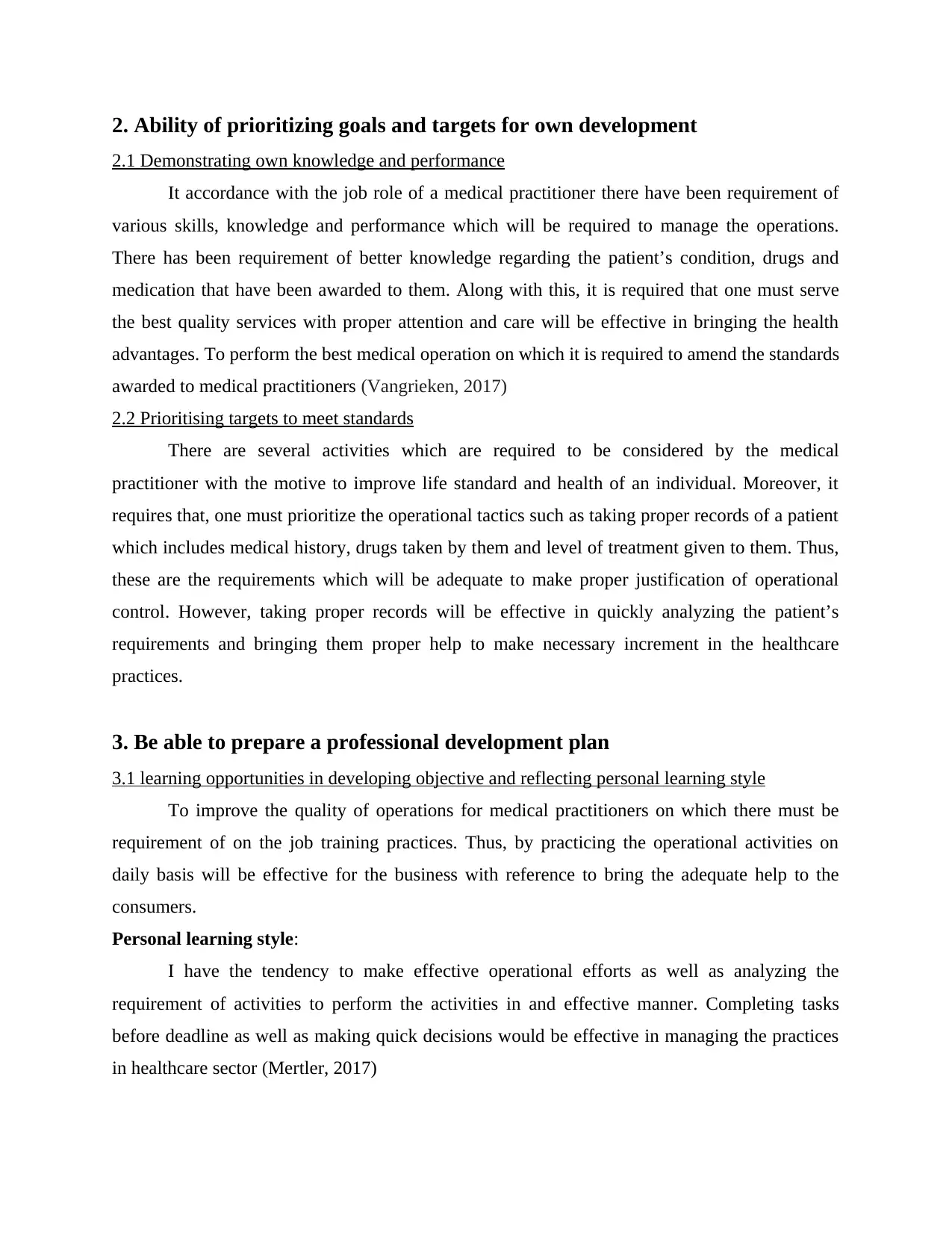
2. Ability of prioritizing goals and targets for own development
2.1 Demonstrating own knowledge and performance
It accordance with the job role of a medical practitioner there have been requirement of
various skills, knowledge and performance which will be required to manage the operations.
There has been requirement of better knowledge regarding the patient’s condition, drugs and
medication that have been awarded to them. Along with this, it is required that one must serve
the best quality services with proper attention and care will be effective in bringing the health
advantages. To perform the best medical operation on which it is required to amend the standards
awarded to medical practitioners (Vangrieken, 2017)
2.2 Prioritising targets to meet standards
There are several activities which are required to be considered by the medical
practitioner with the motive to improve life standard and health of an individual. Moreover, it
requires that, one must prioritize the operational tactics such as taking proper records of a patient
which includes medical history, drugs taken by them and level of treatment given to them. Thus,
these are the requirements which will be adequate to make proper justification of operational
control. However, taking proper records will be effective in quickly analyzing the patient’s
requirements and bringing them proper help to make necessary increment in the healthcare
practices.
3. Be able to prepare a professional development plan
3.1 learning opportunities in developing objective and reflecting personal learning style
To improve the quality of operations for medical practitioners on which there must be
requirement of on the job training practices. Thus, by practicing the operational activities on
daily basis will be effective for the business with reference to bring the adequate help to the
consumers.
Personal learning style:
I have the tendency to make effective operational efforts as well as analyzing the
requirement of activities to perform the activities in and effective manner. Completing tasks
before deadline as well as making quick decisions would be effective in managing the practices
in healthcare sector (Mertler, 2017)
2.1 Demonstrating own knowledge and performance
It accordance with the job role of a medical practitioner there have been requirement of
various skills, knowledge and performance which will be required to manage the operations.
There has been requirement of better knowledge regarding the patient’s condition, drugs and
medication that have been awarded to them. Along with this, it is required that one must serve
the best quality services with proper attention and care will be effective in bringing the health
advantages. To perform the best medical operation on which it is required to amend the standards
awarded to medical practitioners (Vangrieken, 2017)
2.2 Prioritising targets to meet standards
There are several activities which are required to be considered by the medical
practitioner with the motive to improve life standard and health of an individual. Moreover, it
requires that, one must prioritize the operational tactics such as taking proper records of a patient
which includes medical history, drugs taken by them and level of treatment given to them. Thus,
these are the requirements which will be adequate to make proper justification of operational
control. However, taking proper records will be effective in quickly analyzing the patient’s
requirements and bringing them proper help to make necessary increment in the healthcare
practices.
3. Be able to prepare a professional development plan
3.1 learning opportunities in developing objective and reflecting personal learning style
To improve the quality of operations for medical practitioners on which there must be
requirement of on the job training practices. Thus, by practicing the operational activities on
daily basis will be effective for the business with reference to bring the adequate help to the
consumers.
Personal learning style:
I have the tendency to make effective operational efforts as well as analyzing the
requirement of activities to perform the activities in and effective manner. Completing tasks
before deadline as well as making quick decisions would be effective in managing the practices
in healthcare sector (Mertler, 2017)
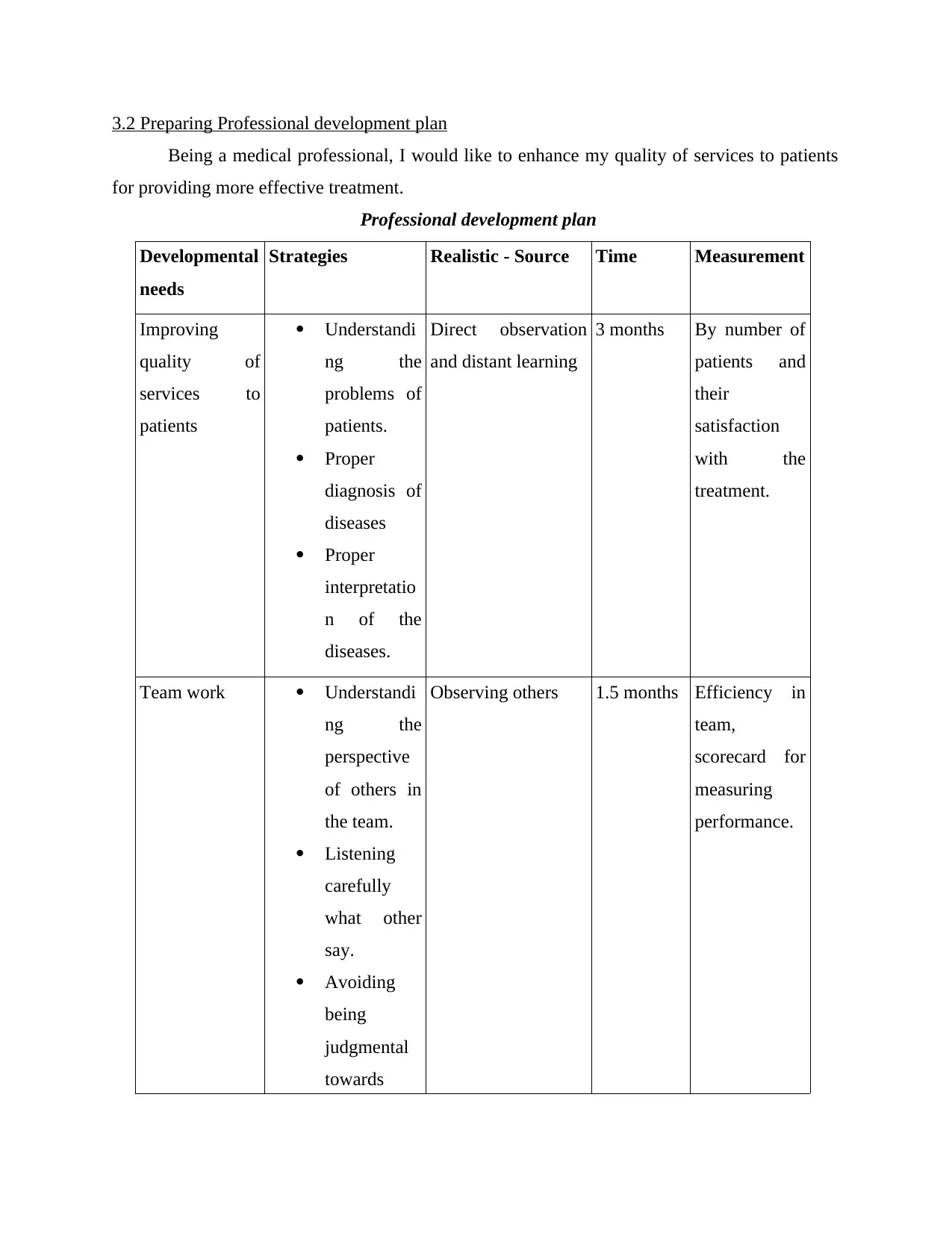
3.2 Preparing Professional development plan
Being a medical professional, I would like to enhance my quality of services to patients
for providing more effective treatment.
Professional development plan
Developmental
needs
Strategies Realistic - Source Time Measurement
Improving
quality of
services to
patients
Understandi
ng the
problems of
patients.
Proper
diagnosis of
diseases
Proper
interpretatio
n of the
diseases.
Direct observation
and distant learning
3 months By number of
patients and
their
satisfaction
with the
treatment.
Team work Understandi
ng the
perspective
of others in
the team.
Listening
carefully
what other
say.
Avoiding
being
judgmental
towards
Observing others 1.5 months Efficiency in
team,
scorecard for
measuring
performance.
Being a medical professional, I would like to enhance my quality of services to patients
for providing more effective treatment.
Professional development plan
Developmental
needs
Strategies Realistic - Source Time Measurement
Improving
quality of
services to
patients
Understandi
ng the
problems of
patients.
Proper
diagnosis of
diseases
Proper
interpretatio
n of the
diseases.
Direct observation
and distant learning
3 months By number of
patients and
their
satisfaction
with the
treatment.
Team work Understandi
ng the
perspective
of others in
the team.
Listening
carefully
what other
say.
Avoiding
being
judgmental
towards
Observing others 1.5 months Efficiency in
team,
scorecard for
measuring
performance.
⊘ This is a preview!⊘
Do you want full access?
Subscribe today to unlock all pages.

Trusted by 1+ million students worldwide
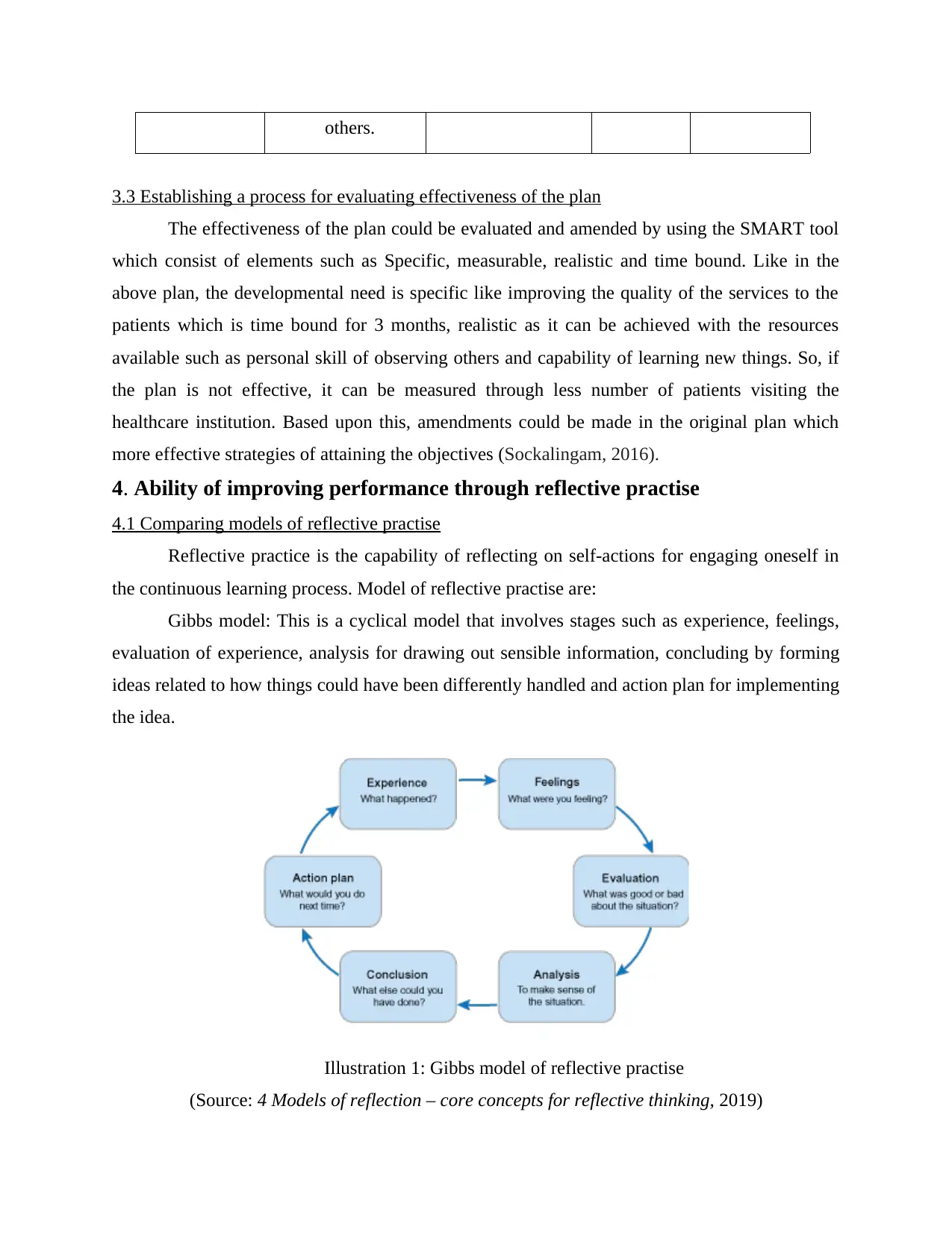
others.
3.3 Establishing a process for evaluating effectiveness of the plan
The effectiveness of the plan could be evaluated and amended by using the SMART tool
which consist of elements such as Specific, measurable, realistic and time bound. Like in the
above plan, the developmental need is specific like improving the quality of the services to the
patients which is time bound for 3 months, realistic as it can be achieved with the resources
available such as personal skill of observing others and capability of learning new things. So, if
the plan is not effective, it can be measured through less number of patients visiting the
healthcare institution. Based upon this, amendments could be made in the original plan which
more effective strategies of attaining the objectives (Sockalingam, 2016).
4. Ability of improving performance through reflective practise
4.1 Comparing models of reflective practise
Reflective practice is the capability of reflecting on self-actions for engaging oneself in
the continuous learning process. Model of reflective practise are:
Gibbs model: This is a cyclical model that involves stages such as experience, feelings,
evaluation of experience, analysis for drawing out sensible information, concluding by forming
ideas related to how things could have been differently handled and action plan for implementing
the idea.
Illustration 1: Gibbs model of reflective practise
(Source: 4 Models of reflection – core concepts for reflective thinking, 2019)
3.3 Establishing a process for evaluating effectiveness of the plan
The effectiveness of the plan could be evaluated and amended by using the SMART tool
which consist of elements such as Specific, measurable, realistic and time bound. Like in the
above plan, the developmental need is specific like improving the quality of the services to the
patients which is time bound for 3 months, realistic as it can be achieved with the resources
available such as personal skill of observing others and capability of learning new things. So, if
the plan is not effective, it can be measured through less number of patients visiting the
healthcare institution. Based upon this, amendments could be made in the original plan which
more effective strategies of attaining the objectives (Sockalingam, 2016).
4. Ability of improving performance through reflective practise
4.1 Comparing models of reflective practise
Reflective practice is the capability of reflecting on self-actions for engaging oneself in
the continuous learning process. Model of reflective practise are:
Gibbs model: This is a cyclical model that involves stages such as experience, feelings,
evaluation of experience, analysis for drawing out sensible information, concluding by forming
ideas related to how things could have been differently handled and action plan for implementing
the idea.
Illustration 1: Gibbs model of reflective practise
(Source: 4 Models of reflection – core concepts for reflective thinking, 2019)
Paraphrase This Document
Need a fresh take? Get an instant paraphrase of this document with our AI Paraphraser
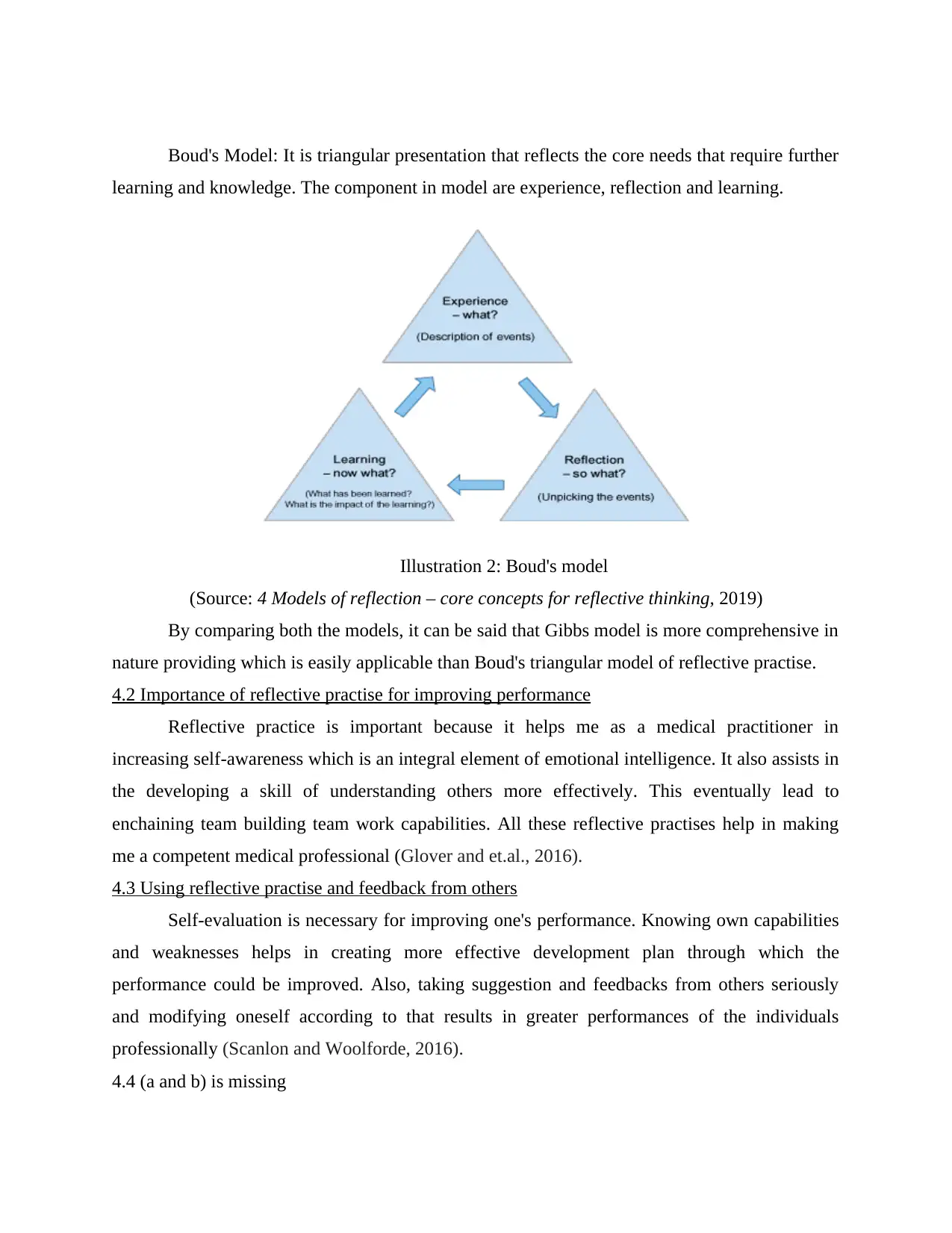
Boud's Model: It is triangular presentation that reflects the core needs that require further
learning and knowledge. The component in model are experience, reflection and learning.
Illustration 2: Boud's model
(Source: 4 Models of reflection – core concepts for reflective thinking, 2019)
By comparing both the models, it can be said that Gibbs model is more comprehensive in
nature providing which is easily applicable than Boud's triangular model of reflective practise.
4.2 Importance of reflective practise for improving performance
Reflective practice is important because it helps me as a medical practitioner in
increasing self-awareness which is an integral element of emotional intelligence. It also assists in
the developing a skill of understanding others more effectively. This eventually lead to
enchaining team building team work capabilities. All these reflective practises help in making
me a competent medical professional (Glover and et.al., 2016).
4.3 Using reflective practise and feedback from others
Self-evaluation is necessary for improving one's performance. Knowing own capabilities
and weaknesses helps in creating more effective development plan through which the
performance could be improved. Also, taking suggestion and feedbacks from others seriously
and modifying oneself according to that results in greater performances of the individuals
professionally (Scanlon and Woolforde, 2016).
4.4 (a and b) is missing
learning and knowledge. The component in model are experience, reflection and learning.
Illustration 2: Boud's model
(Source: 4 Models of reflection – core concepts for reflective thinking, 2019)
By comparing both the models, it can be said that Gibbs model is more comprehensive in
nature providing which is easily applicable than Boud's triangular model of reflective practise.
4.2 Importance of reflective practise for improving performance
Reflective practice is important because it helps me as a medical practitioner in
increasing self-awareness which is an integral element of emotional intelligence. It also assists in
the developing a skill of understanding others more effectively. This eventually lead to
enchaining team building team work capabilities. All these reflective practises help in making
me a competent medical professional (Glover and et.al., 2016).
4.3 Using reflective practise and feedback from others
Self-evaluation is necessary for improving one's performance. Knowing own capabilities
and weaknesses helps in creating more effective development plan through which the
performance could be improved. Also, taking suggestion and feedbacks from others seriously
and modifying oneself according to that results in greater performances of the individuals
professionally (Scanlon and Woolforde, 2016).
4.4 (a and b) is missing
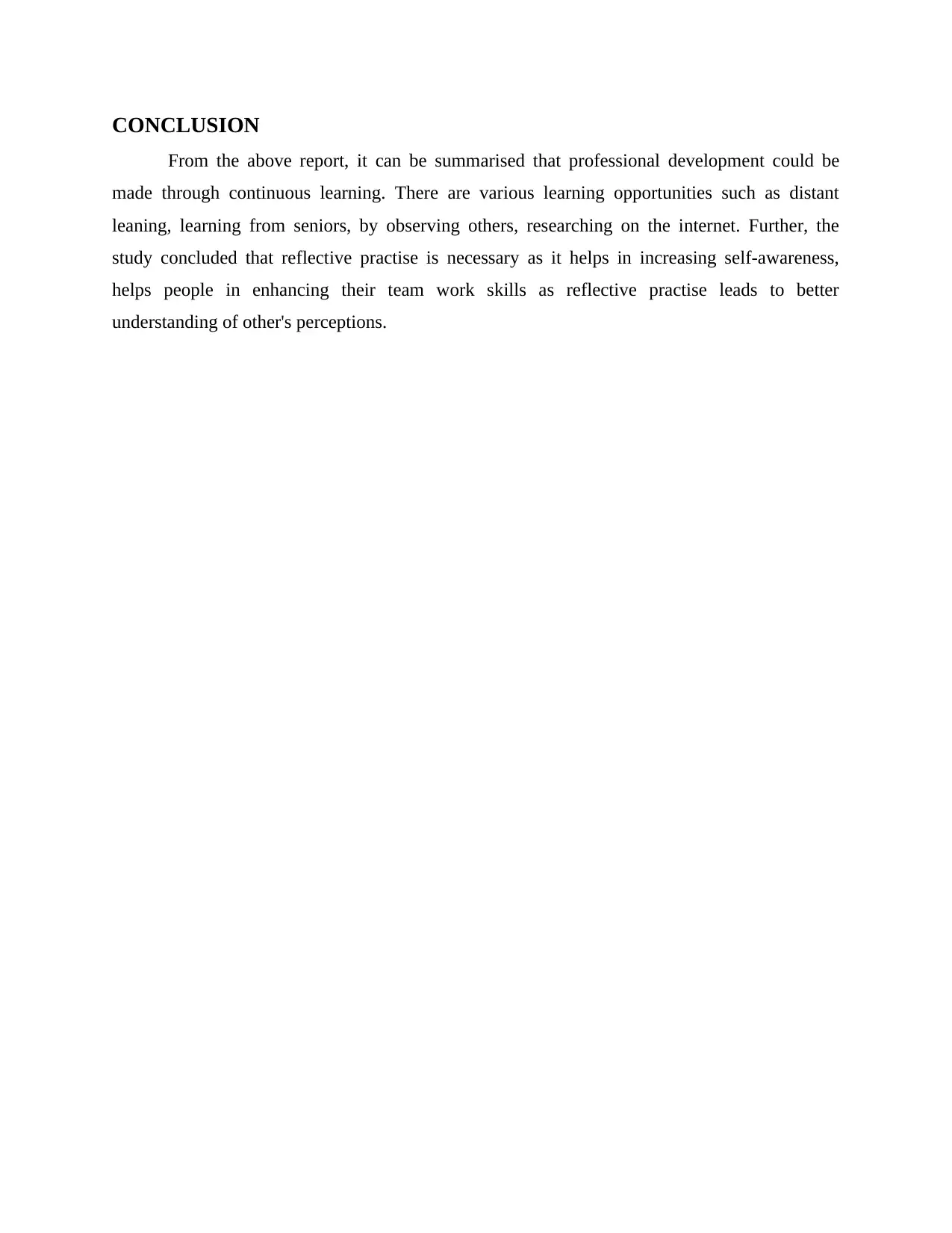
CONCLUSION
From the above report, it can be summarised that professional development could be
made through continuous learning. There are various learning opportunities such as distant
leaning, learning from seniors, by observing others, researching on the internet. Further, the
study concluded that reflective practise is necessary as it helps in increasing self-awareness,
helps people in enhancing their team work skills as reflective practise leads to better
understanding of other's perceptions.
From the above report, it can be summarised that professional development could be
made through continuous learning. There are various learning opportunities such as distant
leaning, learning from seniors, by observing others, researching on the internet. Further, the
study concluded that reflective practise is necessary as it helps in increasing self-awareness,
helps people in enhancing their team work skills as reflective practise leads to better
understanding of other's perceptions.
⊘ This is a preview!⊘
Do you want full access?
Subscribe today to unlock all pages.

Trusted by 1+ million students worldwide
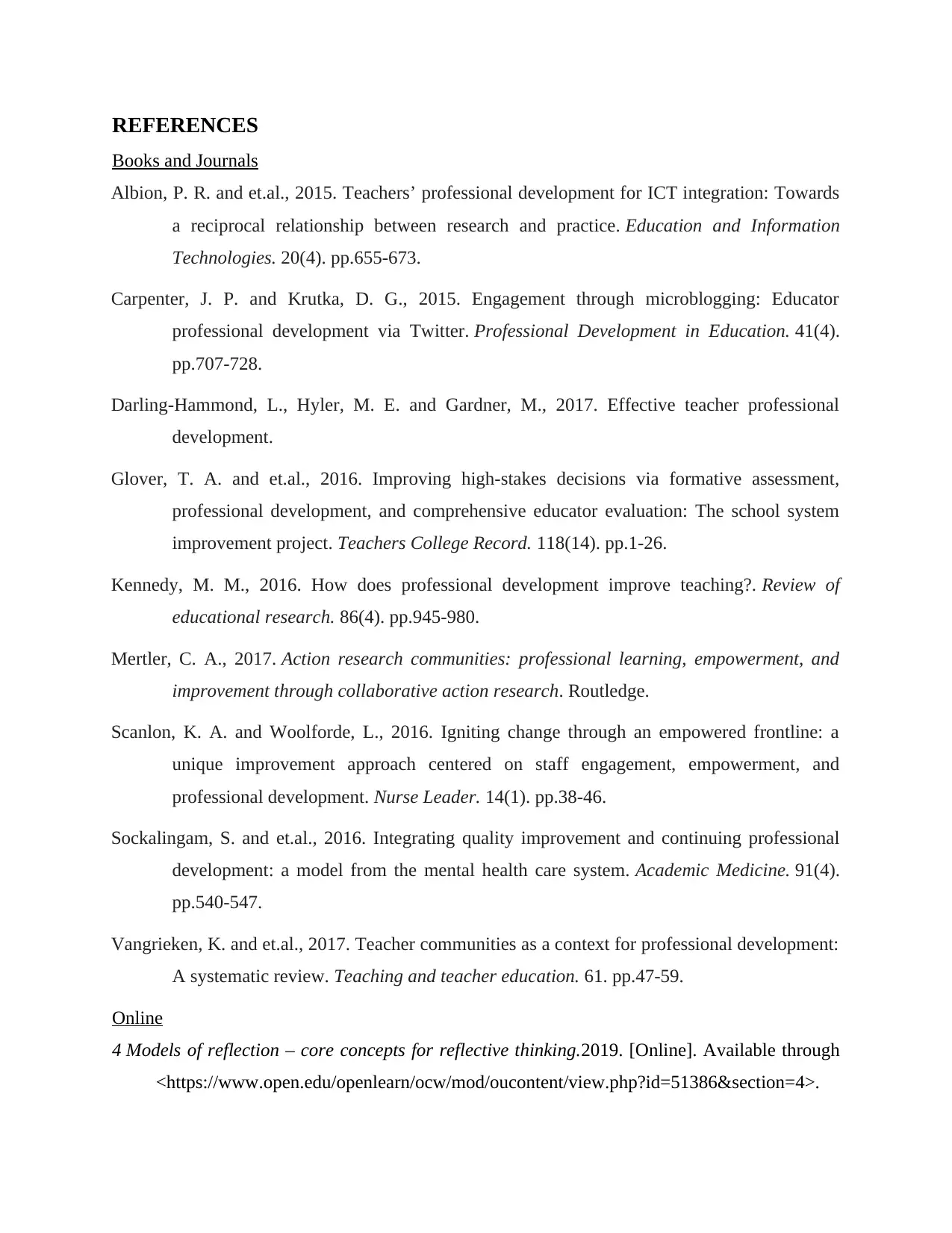
REFERENCES
Books and Journals
Albion, P. R. and et.al., 2015. Teachers’ professional development for ICT integration: Towards
a reciprocal relationship between research and practice. Education and Information
Technologies. 20(4). pp.655-673.
Carpenter, J. P. and Krutka, D. G., 2015. Engagement through microblogging: Educator
professional development via Twitter. Professional Development in Education. 41(4).
pp.707-728.
Darling-Hammond, L., Hyler, M. E. and Gardner, M., 2017. Effective teacher professional
development.
Glover, T. A. and et.al., 2016. Improving high-stakes decisions via formative assessment,
professional development, and comprehensive educator evaluation: The school system
improvement project. Teachers College Record. 118(14). pp.1-26.
Kennedy, M. M., 2016. How does professional development improve teaching?. Review of
educational research. 86(4). pp.945-980.
Mertler, C. A., 2017. Action research communities: professional learning, empowerment, and
improvement through collaborative action research. Routledge.
Scanlon, K. A. and Woolforde, L., 2016. Igniting change through an empowered frontline: a
unique improvement approach centered on staff engagement, empowerment, and
professional development. Nurse Leader. 14(1). pp.38-46.
Sockalingam, S. and et.al., 2016. Integrating quality improvement and continuing professional
development: a model from the mental health care system. Academic Medicine. 91(4).
pp.540-547.
Vangrieken, K. and et.al., 2017. Teacher communities as a context for professional development:
A systematic review. Teaching and teacher education. 61. pp.47-59.
Online
4 Models of reflection – core concepts for reflective thinking.2019. [Online]. Available through
<https://www.open.edu/openlearn/ocw/mod/oucontent/view.php?id=51386§ion=4>.
Books and Journals
Albion, P. R. and et.al., 2015. Teachers’ professional development for ICT integration: Towards
a reciprocal relationship between research and practice. Education and Information
Technologies. 20(4). pp.655-673.
Carpenter, J. P. and Krutka, D. G., 2015. Engagement through microblogging: Educator
professional development via Twitter. Professional Development in Education. 41(4).
pp.707-728.
Darling-Hammond, L., Hyler, M. E. and Gardner, M., 2017. Effective teacher professional
development.
Glover, T. A. and et.al., 2016. Improving high-stakes decisions via formative assessment,
professional development, and comprehensive educator evaluation: The school system
improvement project. Teachers College Record. 118(14). pp.1-26.
Kennedy, M. M., 2016. How does professional development improve teaching?. Review of
educational research. 86(4). pp.945-980.
Mertler, C. A., 2017. Action research communities: professional learning, empowerment, and
improvement through collaborative action research. Routledge.
Scanlon, K. A. and Woolforde, L., 2016. Igniting change through an empowered frontline: a
unique improvement approach centered on staff engagement, empowerment, and
professional development. Nurse Leader. 14(1). pp.38-46.
Sockalingam, S. and et.al., 2016. Integrating quality improvement and continuing professional
development: a model from the mental health care system. Academic Medicine. 91(4).
pp.540-547.
Vangrieken, K. and et.al., 2017. Teacher communities as a context for professional development:
A systematic review. Teaching and teacher education. 61. pp.47-59.
Online
4 Models of reflection – core concepts for reflective thinking.2019. [Online]. Available through
<https://www.open.edu/openlearn/ocw/mod/oucontent/view.php?id=51386§ion=4>.
1 out of 10
Related Documents
Your All-in-One AI-Powered Toolkit for Academic Success.
+13062052269
info@desklib.com
Available 24*7 on WhatsApp / Email
![[object Object]](/_next/static/media/star-bottom.7253800d.svg)
Unlock your academic potential
Copyright © 2020–2026 A2Z Services. All Rights Reserved. Developed and managed by ZUCOL.



